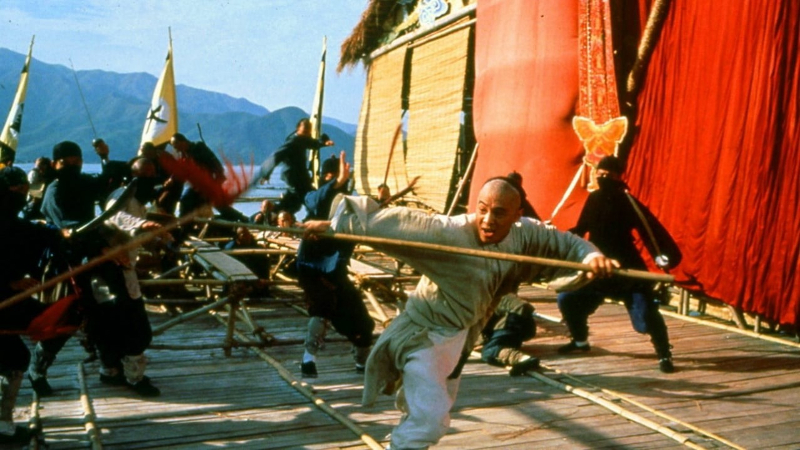Director – Tsui Hark – 1991 – Hong Kong – Cert. 15 – 135m
****1/2
Groundbreaking, period martial arts epic features some of the most spectacular stunt sequences ever filmed, spawned five sequels and made Jet Li a star – online in the UK as part of Focus Hong Kong 2021 Easter from Wednesday, March 31st to Tuesday, April 6th
The real life Wong Fei Hung (1847-1925) was a Chinese practitioner of martial arts and medicine who lived in Foshan and has been the subject of over a hundred films. Tsui Hark’s 1991 production is one of the best known and spawned a series of six movies in total, four of them with Jet Li as Wong, arguably his most iconic role.
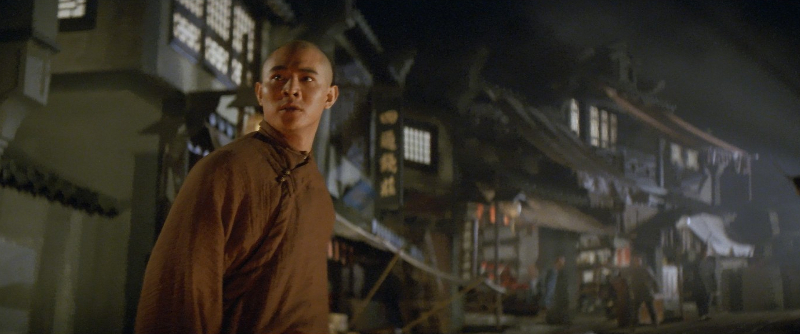
Militia-laden American and British and French ships anchored in the harbour put Foshan in an uneasy position and Wong is concerned, as well he might be since it turns out in the course of the narrative that the Americans under a man named Jackson (Jonathan Isgar) are not only tricking local men into debt via getting them to pay for their passage to San Francisco but also trafficking Chinese women into prostitution in the New World. The film isn’t particularly interested in these misdemeanours except as providing motivation for its villain.
Wong also has to contend with the return of the girl who although roughly his own age he must formally address as 13th Aunt (Rosamund Kwan). Their relative social positions make a relationship impossible,. She is back from two years in England where she has been impressed by such technological advancements as the steam engine and photography, the latter spawning her use of a camera and tripod to take photographs throughout the narrative. The only photograph we ever see is the one that closes the film in a gag where Wong, 13th Aunt and Wong’s acolytes are surprised into moving just at the moment the shutter clicks.
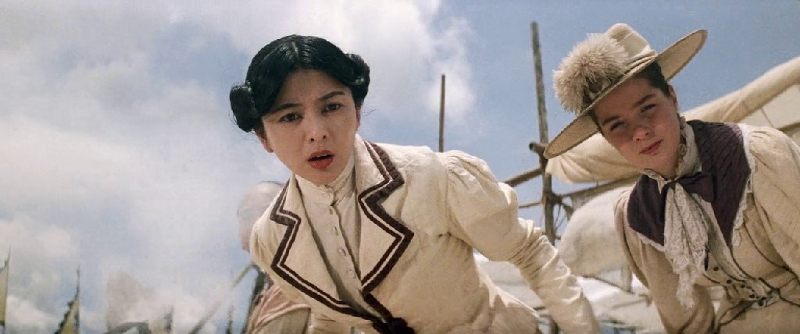
Three students train under Wong; the portly ‘Porky’ Wing (Kent Cheng), Ling Wan-kai or Kai (Yuen Kam-fei) – both in martial arts – and ‘Toothpaste’ So (Jacky Cheung) – in medicine. Out of town provincial drifter Leung Foon (Yuen Biao) hopes to become Wong’s apprentice too. In addition to the foreigners or ‘white devils’, he faces further dual opposition in the form of both local gang the Shahe who run an extortion racket Wong wants to shut down and ‘Iron Robe’ Yim Chun-tung (Yee Kwan Yan aka Yen Shi-kwan) who wants to defeat Wong in a fight to make a name for himself and establish his own Fushan martial arts school.
A line of dialogue early on mentions the “unequal treaties” that gave Hong Kong to the British and Macao to the Portuguese, capitalising on the understandable resentment felt by the Chinese about this. The Westerners are fairly cardboard being either out and out villains, militia extras who point guns at the Chinese or proselytising Jesuits. The local Jesuit priest (Colin George), who wanders around observing without getting involved, gets the best deal since he is the only person in the film who agrees to help Wong by being a witness in court to testify against the local gang and their protection rackets when the indigenous Chinese refuse to do so.
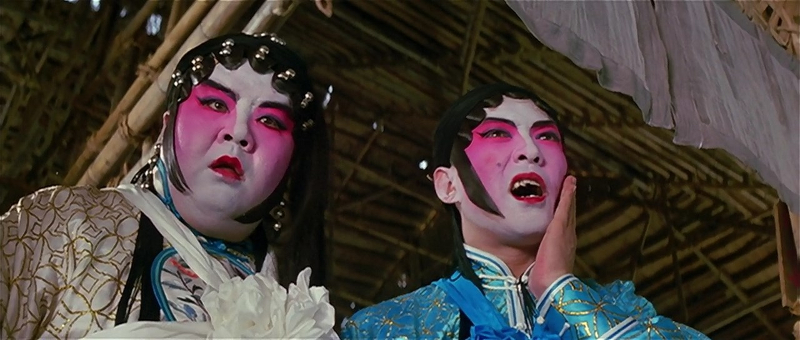
Script and plot, such as they are, are however pretty threadbare and primarily an excuse for some unremarkable, knockabout Hong Kong style comedy, a recreation of late nineteenth century Foshan, the demonising of Westerners and, more significantly, a series of spectacular action set pieces.
Two men perform in a dragon costume on a ship. A mass brawl after Foon and Wing pick a fight with the Shahe thugs spills over into a posh, English-styled restaurant where Wong is lunching with a local Chinese administrator, the American Jackson and the British General Wickens (Mark King). Wong’s school at Po Chi Lam is attacked by the Shahe using flaming arrows. An open air night fight between ‘Iron Robe’ Yim and an adversary shows off the former’s prowess while a huge pyre burns in the background. A premeditated attack by Wickens and his soldiers on a Peking Opera show where Wong and 13th Aunt are in attendance turns into a civilian massacre. Fights between the restless Yim and the calmer Wong include, in the middle of a finale where Wong and students enter Jackson’s compound to rescue thirteenth Aunt and other soon to be trafficked women, a fight in the warehouse featuring the most incredible use of moving ladders you’ve ever seen.
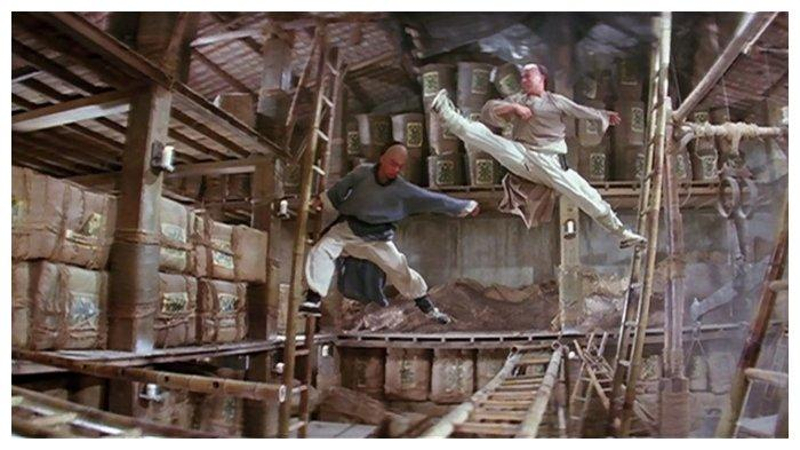
This latter sequence goes on some considerable time. Jet Li and Yen Shi-kwan pull upright ladders off one resting place, into mid-air and onto another. Li twirls his ladder around while it’s upright with him standing on it. Judicious use of aerial wire work and various permutations of ladders in various states of stable or unstable equilibrium ensure that this highly inventive sequence never gets dull or stale – it’s a sequence which can be rewatched again and again over the years without ever becoming dull.
That’s true of all the action sequences in this film, which remain fresh and incredible by today’s standards. When you think that Hollywood didn’t make anything remotely like this until producer Joel Silver barnstormed the world with The Matrix (The Wachowski Brothers as they then were, 1999) that means Once Upon A Time In China was all the more impressive when it first appeared in 1991. It pretty much put Jet Li on the map as a star, who Silver would later introduce to the US by casting him as a villain in Lethal Weapon IV (Richard Donner, 1998).
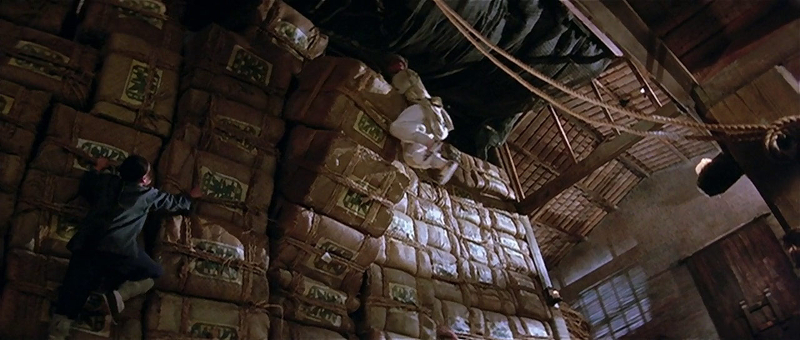
Hong Kong, though, had already been wowed when Tsui mixed familiar martial arts action with wire work and full on special effects for his supernatural epic Zu Warriors From The Magic Mountain (1983). Once Upon A Time In China dispenses with the supernatural special effects to go all out for the action and unleashed a major action star upon the world in the form of Jet Li.
Once Upon A Time In China plays online in the UK as part of Focus Hong Kong 2021 Easter from Wednesday, March 31st to Tuesday, April 6th.
Trailer:
